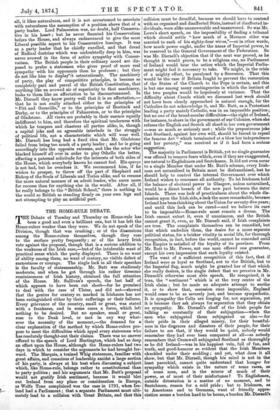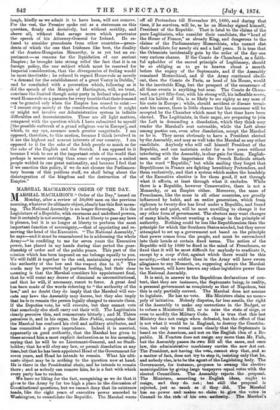THE H031E-RULE DEBATE.
THE Debate of Tuesday and Thursday on Home-rule has been a good and even a brilliant one, but it has left the Home-rulers weaker than they were. We do not speak of the Division, though that was crushing ; or of the dissensions among the Home-rulers themselves, though they rose to the surface pretty frequently ; or of the heavy Irish vote against the proposal, though that is a serious addition to the weakness of the Irish case,—but of the intolerable want of practical sense which the party displayed. There is no want of ability among them, no want of oratory, no visible defect of earnestness or courage. The single lack in all their speeches is the faculty of statesmanship. Mr. Butt was studiously moderate, and when he got through his rather tiresome reminiscences of Irish history, obtained the full attention of the House. Mr. Sullivan's speech, the last half of which appears to have been cut short—for he promised to deal with the ease of Ulster, and did not—showed that the genius for oratory so marked in Irishmen has not been extinguished either by their sufferings or their failures. Every grievance of the country, small or great, was stated with a frankness, and in some cases a force, which left nothing to be desired. But no speaker, small or great, rose to the Deak level, or met in any way what- ever the necessity of the moment,—the demand for a clear explanation of the method by which Home-rulers pro- pose to meet the difficulties which appal every statesman who has resolutely thought-out their claims. There was no answer offered to the speech of Lord Harlington, which had so deep an effect upon the House, although the Horne-rulers had two days in which to consider the arguments he had brought for-
ward. The Marquis, a trained Whig statesman, familiar with great affairs, and conscious of leadership amidst a large section of his party, is always at his best when discussing a subject which, like Home-rule, belongs rather to constitutional than to party politics ; and his arguments that Mr. Butt's proposal would not gratify Irish sentiment, because it would blot out Ireland from any place or consideration in Europe, as Wolfe Tone complained was the case in 1791, when Ire- land had a Parliament ; that a separate Parliament must ulti- mately lead to a collision with Great Britain, and that this
collision must be dreadful, because we should have to contend with an organised and disaffected State, instead of disaffected in- dividuals, were alike unanswerable and unanswered. So was Mr. Lowe's short speech, on the impossibility of finding a tribunal which should settle "how much of a Mormon elder was married to each of his eighty-four wives,"—or in other words, how much power ought, under the name of Imperial power, to be reserved to the General Government of the Federation. So was Mr. Disraeli's objection that if the next war proved, as he thought it would prove, to be a religious one no Parliament of Ireland would bear the action which the imperial Parlia- ment might feel it necessary to take. We might, in the crisis of a mighty effort, be paralysed by a Secession. That this would be the case if Britain fought to prevent the restoration of the States of the Church to the Pope is certain, and this is but one among many contingencies in which the instinct of the two peoples would be hopelessly at variance. That the difficulty about Creeds which we discussed last week should not have been closely approached is natural enough, for the Catholics do not acknowledge it, and Mr. Butt, as a Protestant leading a party mainly Catholic, was in an impossible position; but no one of the broad secular difficulties—the right of Ireland, for instance, to share in the government of our Colonies, when she refuses the English and Scotch all sharo in her own government —was so much as seriously met ; while the preposterous joke that Scotland, against her own will, should be forced to repeal the famous Act "which terminated at a blow her independence and her poverty," was received as if it had been a serious suggestion.
The majority in Parliament is British, yet no single guarantee was offered to remove fears which, even if they are exaggerated, are natural to Englishmen and Scotchmen. It did not even occur to a single Member that under Mr. Butt's scheme, every Irish- man not naturalised in Britain must be disfranchised, lest he should help to control the internal Government over which Ireland wishes to renounce all authority. To let Irishmen hold the balance of electoral power in Glasgow, unless naturalised, would be a direct breach of the new pact between the sister Islands. There was lack of practicalness about the whole dis- cussion upon the Irish side, a lack the more remarkable, because Ireland has been thinking about the Union for seventy-five years; and until this lack can be cured—and we believe its cure to be impossible—Home-rule must remain a dream. The Irish cannot extort it, even if unanimous and the British cannot grant it, even, as Mr. Disraeli said, if Irish complaints are true. The complaints themselves can be remedied, but that which underlies them, the desire for a more separate political status, for a brisker vitality in social life, for thorough recognition, in fact, before the world, cannot be conceded until the Empire is satisfied of the loyalty of its province. From Mr. Butt to Mr. Power, not one man offered one guarantee, except his own impression that such loyalty existed.
The want of a sufficient recognition of this fact, that if Ireland were as loyal as Scotland, not to the British, but to the Imperial flag, much might be granted her of that which she really desires, is the single defect that we perceive in Mr. Disraeli's otherwise most able speech. He recognised, it is true, the " sentiment " which is at the very centre of the Irish claim ; but he made no adequate attempt to soothe it, or to show that, secession once impossible, England would cease to be so severely just, and become sympathetic. It is sympathy the Celts are longing for, not separation, yet it is because they ask always for separation that they obtain no sympathy. Mr. Disraeli's chaff of the Irish people for talking so constantly of their subjugation—when the men who subjugated them subjugated us also —for their pride in their alleged misery, for their boastful- ness in the disgraces and disasters of their people, for their failure to see that, if they would be quiet, nobody would remember they had ever been conquered at all—as nobody
remembers that Cromwell subjugated Scotland as thoroughly as he did Ireland—was in his happiest vein, full of fun, and
truth, and good-humour so evident that the Irish Members
chuckled under their scolding ; and yet, what does it all show, but that Mr. Disraeli, though his mind is not in the
least parochial, cannot quite understand that hunger for
sympathy which exists in the nature of some races, as of some men, and is the source of much of their
power, as of most of their misfortunes ? To Englishmen,
outside detestation is a matter of no moment, and to Scotchmen, reason for a cold pride ; but to Irishmen, as to Americans and to Germans, want of friendly appre- ciation seems a burden hard to be borne, a burden Mr. Disraeli's laugh, kindly as we admit it to have been, will not remove. For the rest, the Premier spoke out as a statesman on this qnestion, firmly and decisively, but without acridity, and above all, without that savage scorn which penetrates the speech of his Attorney-General for Ireland. He re- fused to consider precedents from other countries--prece- dents of which the one that Irishmen like best, the duality of the Austro-Hungarian Monarchy, is as yet but an ex- periment—as reasons for the liquidation of our ancient Empire ; he brought into strong relief the fact that it is on foreign policy, the one subject which must be reserved for Imperial consideration, that the divergencies of feeling would be most inevitable ; he refused to regard Home-rule as merely "a demand for the establishment of a great Vestry in Dublin," and he concluded with a peroration which, following as it did the speech of the Marquis of Harlington, will, we trust, convince the limited though noisy party in Ireland who put for- ward Home-rule as a panacea for every trouble that their demand can be granted only when the Empire has ceased to exist :— "• I cannot stop merely at the consideration whether it might or might not involve our Administrative system in infinite difficulties and inconsistencies. These are all light matters, compared with the question which I have submitted to myself [the possible outbreak of a grand religious war in Europe], and which, to my eye, assumes much greater magnitude. I am opposed, therefore, to this motion, because I think involved in it are the highest and nearest interests of our country. I am opposed to it for the sake of the Irish people as much as for the sake of the English and the Scotch. I am opposed to it because I wish to see at the important crisis of the world that perhaps is nearer arriving than some of us suppose, a united people welded in one great nationality, and because I feel that if we sanction this policy, if we do not cleanse the Parliamen- tary bosom of this perilous stuff, we shall bring about the disintegration of the kingdom and the destruction of the Empire."



































 Previous page
Previous page